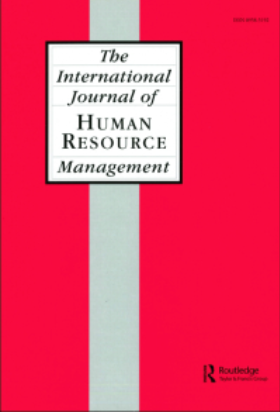对上下级关系中二元性的文化探究
IF 4.9
2区 管理学
Q1 MANAGEMENT
International Journal of Human Resource Management
Pub Date : 2020-01-19
DOI:10.1080/09585192.2015.1137619
引用次数: 46
摘要
摘要“关系”是中国管理学和组织学中的一个重要概念,被广泛地视为一个关系概念。然而,有必要对“关系”进行细致入微的语境化理解,借助中国传统文化来审视其文化渊源。我们借鉴了新兴的关于双元性和人力资源管理的文献,在上下级关系的背景下研究关系,并将双元性关系概念为具有两种取向:关系型和绩效型。为了研究上下级关系背景下的双向关系,我们对中国国有企业的管理者进行了深入的定性叙事访谈。我们的研究结果揭示了三个维度:忠诚度、对主管的依赖和工作优先级,通过这三个维度,“双灵巧”关系能够、促进和调节个人职业发展与对组织的承诺之间的紧张关系。从文化探究的角度来看,我们认为……本文章由计算机程序翻译,如有差异,请以英文原文为准。
A cultural inquiry into ambidexterity in supervisor–subordinate relationship
AbstractGuanxi is a key construct in Chinese management and organization scholarship, and has been widely treated as a relational concept. However, it is necessary to gain a nuanced and contextualized understanding of Guanxi to examine its cultural antecedents by resorting to traditional Chinese cultures. We draw upon the emerging literature on ambidexterity and HRM to examine Guanxi in the context of superior–subordinate relationship and conceptualize ambidextrous Guanxi as possessing two orientations: relational and merit-based. To investigate ambidextrous Guanxi in the context of superior–subordinate relationship, we perform in-depth, qualitative narrative interviews with managers in Chinese state-owned enterprises. Our results reveal three dimensions: loyalty, dependence upon supervisor and work priority by which ambidextrous Guanxi enables, facilitates and accommodates the tension between individual career advancement and commitment to the organization. From a cultural inquiry perspective, we argue t...
求助全文
通过发布文献求助,成功后即可免费获取论文全文。
去求助
来源期刊
CiteScore
11.70
自引率
7.10%
发文量
77
期刊介绍:
International Journal of Human Resource Management is the forum for HRM scholars and professionals worldwide. Concerned with the expanding role of strategic human resource management in a fast-changing global environment, the journal focuses on future trends in human resource management, drawing on empirical research in the areas of strategic management, international business, organizational behaviour, personnel management and industrial relations that arise from: -internationalization- technological change- market integration- new concepts of line management- increased competition- changing corporate climates Now publishing twenty-two issues per year, The International Journal of Human Resource Management encourages strategically focused articles on a wide range of issues including employee participation, human resource flow, reward systems and high commitment work systems. It is an essential publication in an exciting field, examining all management decisions that affect the relationship between an organization and its employees. Features include; -comparative contributions from both developed and developing countries- special issues based on conferences and current issues- international bibliographies- international data sets- reviews

 求助内容:
求助内容: 应助结果提醒方式:
应助结果提醒方式:


